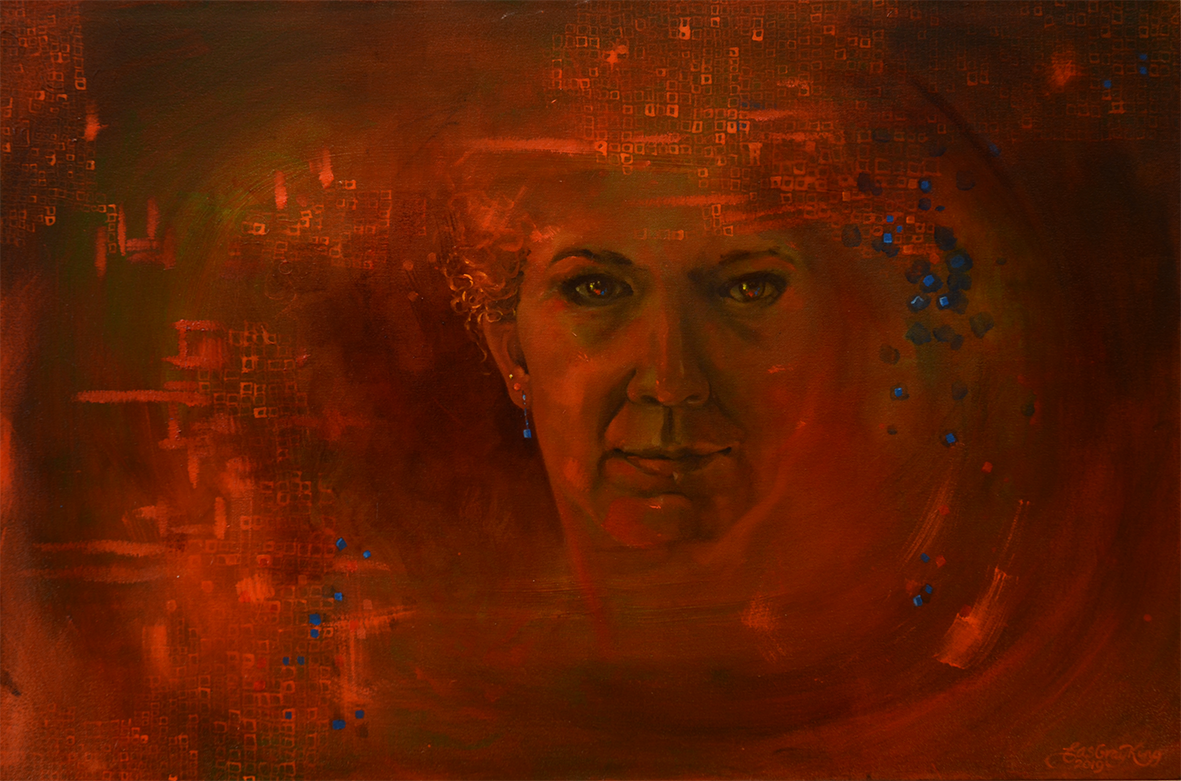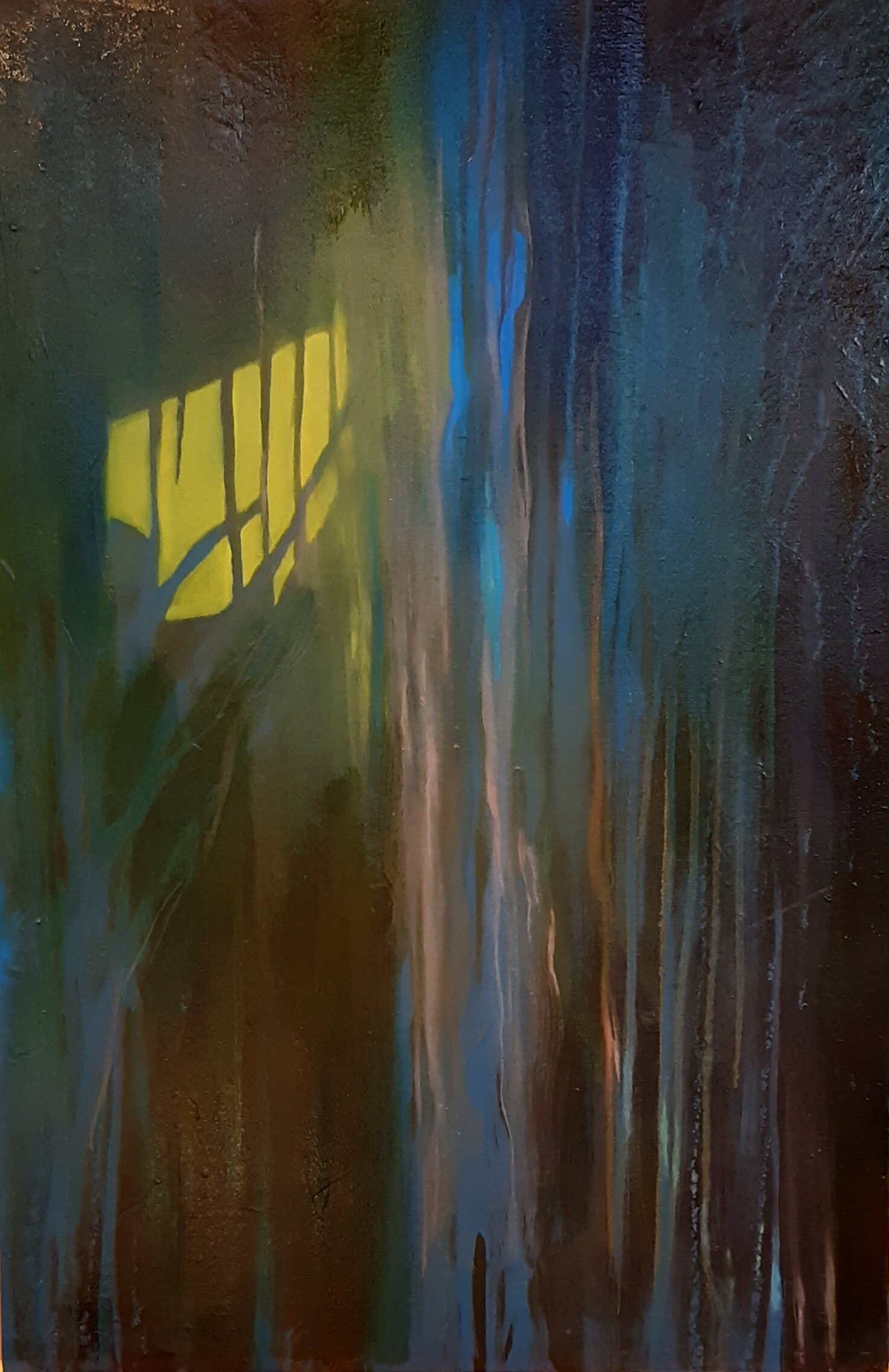This is Red. She was painted in 2019, in a rush of having seen her face emerge from the shadows of the canvas I’d be ‘scribbling’ on for ages. My photographer husband, Pete, and I had a great photoshoot last weekend, capturing Red and her companion, Unafraid. I’ll tell you about her in a bit because she’s going to be in my next book coming out in the summer. In the meantime, here’s Red, a mirror view of her artist which is why her earrings are in the ‘wrong ear’ if you’re used to seeing me. It makes me wonder about artist self portraits through the years and whether we’re all looking at mirror images!
Here's the new book!!!!
Here it is! Off the press and available from today!!! Quite a milestone and one I never knew would be on my own ToDo list. I’m delighted. What else to say? It’s the only book addressing what it is like to do project management in the social benefit sector ( charities, social enterprises, constituted organisations, good causes). It focusses on positive changes made via heart-ful processes - so on the changes we want to make via processes which empower, not stifle. According to Helen, my Foreword writer, it is an “essential addition to any modern organisation,” “so that as many organisations and individuals are empowered to create the greatest impact they can for their beneficiaries.”
I wrote this for all the reasons Helen says and more. I heard story after story from delegates to my DSC Practical Project Management course that people were appointed to management roles for their passion for the work of their charity. They weren’t promoted or hired for their project skills and had to bring a variety of experience and will-power to help them turn their knowledge about their beneficiaries into practical processes to run projects to help them. Delegates felt frustrated, unprepared, and frankly, not helped by the usual corporate project management processes and training. A book needed to be situated firmly in this world of difference we inhabit. So I agreed to do it. Here it is, steeped in our need to make a positive difference and to use some finely honed tools to help. You can order here: Directory of Social Change - Practical Project Management for voluntary organisations (dsc.org.uk)
Lent and Pandemic
Happy blog post title, hm? Yes and no. Many of us recoil even from the word pandemic, rightly wanting to mark these odd times simply living as if this strange reality hasn’t touched us yet, or isn’t going to anymore. This is as good a coping strategy as many and as long as we don’t move to the ‘hoax’ version of truth, we can keep going kindly to us and others and we’ll all see each other eventually. For others, we recoil from the word Lent, having as it does, layers and layers of meaning, ritual and rigidity depending on how we’ve encountered it.
As ever, I seek to re-frame; to find the positive reality in the midst of the encompassing reality we’re experiencing. The pandemic is. It is simply a reality. It has been horrible for many, exhausting for even more, tragic for more than that and life changing for all of us. I’ll seldom teach my project management in a classroom again. Not that there will be no more classrooms, but because the course is so much better when people who’ve never met before are in their own comfort zones, are with their own technology, have access to their real work files and are not frustrated in finding an unknown venue on top of travelling to it. There have been so many positive developments in relationships and communities of friendship, worship and learning, that I have no yearning to move ahead in time to what used to be.
Lent, to me, is an annual reminder in the cycle of my memory work with God. Each year, I cycle from Advent to Pentecost stopping in Lent to remember. It is that particular season when I revisit the political upheaval caused by a revolutionary prophet, come to name the painful truth inside societies and religions then and now. Some society and religious people are proud of themselves, believing their own myths of wealth and equity, while so many in their midst know poverty as a life-long sentence. Lent is reminder time and I live it by laying down the things which worry me and I can’t change – a bit like the strategy to avoid the word pandemic. But as I put down what I can’t change, I pick up the calls to justice I see everywhere. If I stop giving power to my worry, I can re-energise my hope and my activity towards that for others.
Here’s a prayer I wrote for the pandemic, available on the United Reformed Church website:
Dear and glorious God, we cry to you.
At the moment, love seems both deeply hidden and alive like never before.
Selfishness is alarmingly exposed, numbing us to the fear which feeds it.
Selflessness is gloriously and exhaustingly alive, restoring our faith in you and in humanity.
In this Lenten time, stir in us, waking your love, enriching us with grace to be gracious.
Comfort us to know that our small steps made well are your active, powerful love.
Amen.
God is not HE. What’s the problem?
Except for an infinitesimally miniscule moment in the entirety of time, God is not human. A minute moment in history, God was human in Jesus, a man. That’s it. A blink in the eye of eternity. God is not human; not she, not he, not they. God is most likely Spirit, but that’s a human way of describing how God is God. No pronoun works. So?
When I was preparing for ministry in the 1980s, I had a deep long conversation with a man steeped in God-is-Male Christianity. I was told that I couldn’t be ordained because I was a woman, though I am part of a church which has done so for over 100 years. After a very detailed chat in which I defended my right (why did I have to do this?), I was finally told, “Well, I can see that you are called to be a minister. Maybe God wants you to have a sex change?” This was seriously said. The male-ness was more important than faith, and significantly more important that justice.
Yes, this is about me, but it is also a huge, huge deal for all of us. Huge. In Jesus’ time and in the few hundred years immediately after him, leadership of the followers and then the groups of early Christians had mixed leadership, in radical contrast to the culture in which Jesus-believers believed and in critical contrast to the religion in which Jesus grew. When the Roman empire appropriated a handy ‘new’ religion with lots of followers, the women left the mix, painted out of many of the images of women in leadership on the walls of the Catacombs under the streets of Rome. The church became a copy of the empire which used it. That leaders were and always are men became the marrow of the bones inside the new religion named after the Jew the believers followed.
This is a big deal. Look at any society in 2021 which is modelled on leadership as male. See injustice for many, not just for women. Look at any institution which is modelled on leadership as male. See the injustice couched in ‘experience’, ‘tradition’, ‘scripture’. We know that justice is not flowing on the ground in any country or institution – but look to those countries, religions and sects where leadership is modelled on male power, and we see far more denial of human rights for far more people of all colour, many sexualities and people in poverty. The male-ness of God is tied up in the male-ness of power itself and with it, inappropriate access to wealth and dangerous denial of basic human rights to swathes of people. Think education, health, the City, industry – many organisations taking their organisational models from religious practice. See injustice, inappropriate share of wealth, leadership filtered into a few elite wealthy men. Generally white. I could go on and on (and on and on).
To continue to push the God as He model is to feed the soil of human injustice. To continue to push the God as He model shrinks God to a human notion of what power is. Yet, in that one moment when God was associated with a pronoun, and from the testimony of people to this day whose lives were changed as a result, God is not power, but presence, courage and peace. To continue to Make God Male is more than diminishing to God, more than dangerous to ourselves and significantly dangerous to the societies of which we are part.
I call on my colleagues and friends. Let’s be as radical as we often say we are. To change our language is powerful and it changes societies. If we all truly mean to be people of justice, we have to change what we say. It is time. The world needs us to chip at the structures of power
Not the newbie I expected
Light in the Deep was just finished. A few moments ago. Did I know it would be called that? Nope. Did I know that there would be windows in a shed or light through trees? Not a clue. But here we are. Today. This pic from my phone will be replaced by a proper one (!).
Closer to newbies
Canvasses arrived last week. Thrilling! They'll end up as two series of six pieces, of what I haven't a clue, but they'll tell me. I started watching and listening today as I painted out my brushes from working on the grey steels which went on the wall rack last week. When they've done, they’ll tell me more which I'll write. Then the images and the paintings will end up in two books. This year. Quite excited (!l.
Let the painting flow!
Four steel panels for one of HM's RN ships, to be installed in the chapel. They are SO heavy that I’ve not been able to have them side by side to see the whole view. Today I had storage rails made and here they are! The exciting thing is that as I watch these grow into what I’ve imagined, then I’ll paint out my brushes on new canvasses - and I have no idea what they'll be! Excited? Me? Oh yes. And no matter what challenges are thrown in our paths, creativity will contribute to new futures.







